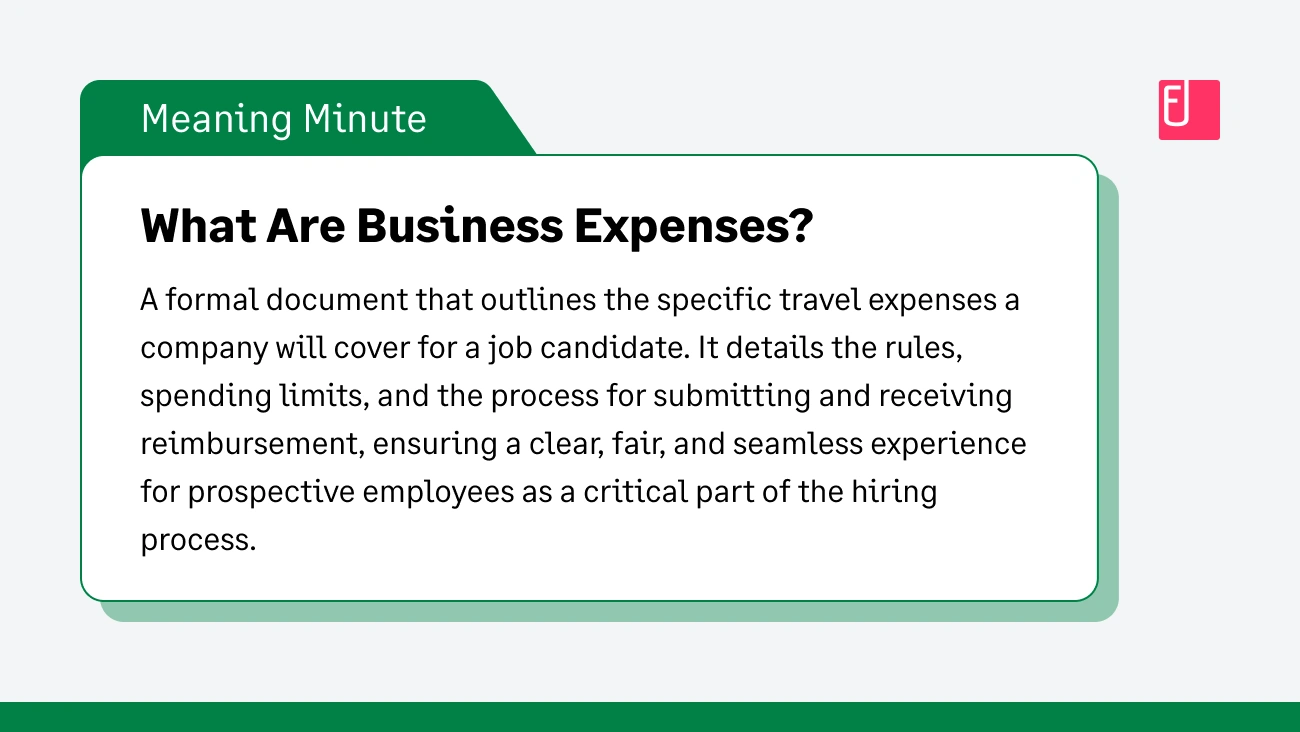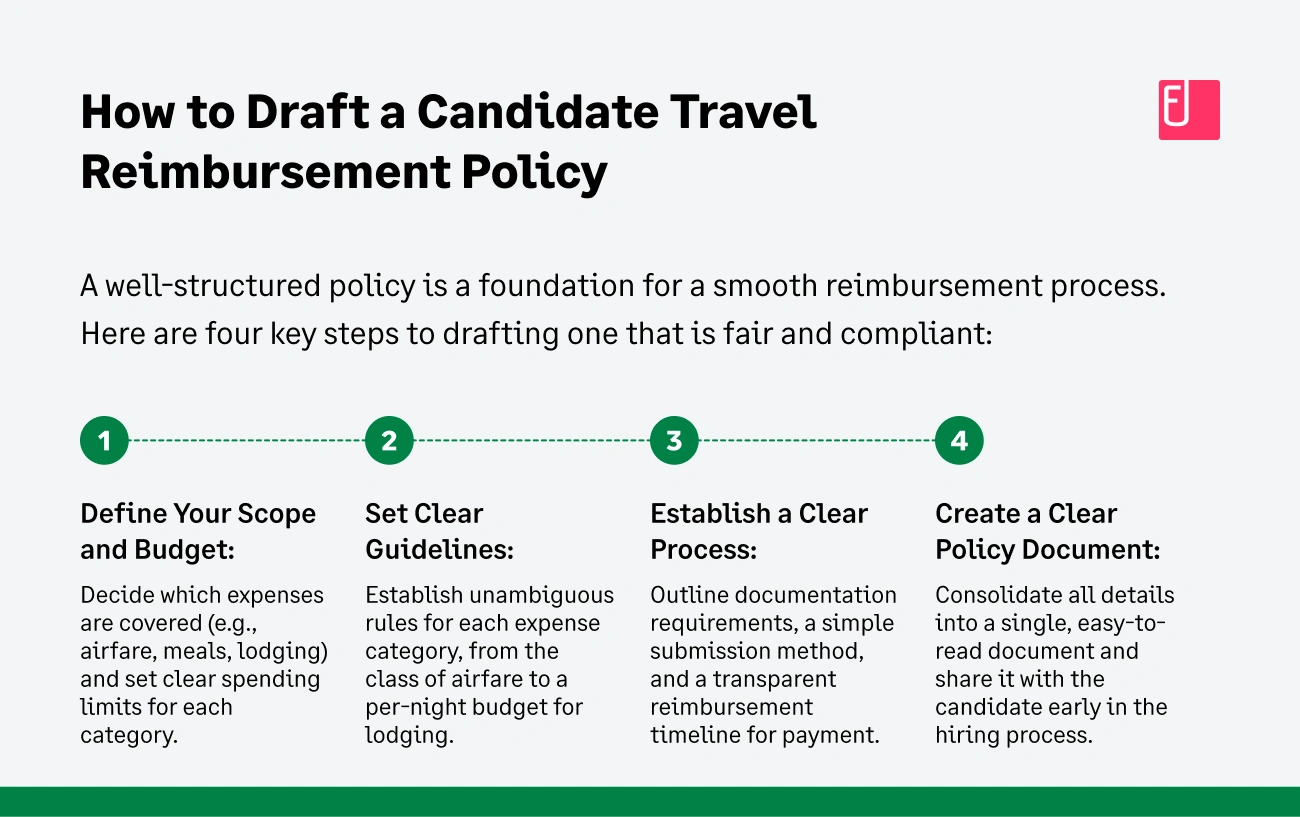First impressions are everything—especially when it comes to attracting new talent. Today, candidates are often willing to travel for the right job, but a hitch in your expense reimbursement process can create immediate doubt. A clunky, opaque reimbursement system can give the impression that your company isn't serious about efficiency or its people. On the other hand, a seamless and transparent reimbursement experience can be a powerful competitive advantage.
Providing candidates with a great hiring experience extends beyond just offering travel and expense reimbursements. Your company must be able to deliver a modern and prompt reimbursement process that builds trust and reinforces your company culture. This is precisely where a well-drafted reimbursement policy and the right technology come in.
In this article, we'll focus on candidate travel reimbursement and its importance. We’ll look at the crucial IRS rules you need to know and provide quick tips on how to enforce a policy that makes a great impression effectively.
What is a Candidate Travel Reimbursement Policy?

A candidate travel reimbursement policy is a formal document that outlines the specific travel expenses an organization will cover for a job candidate. It details the rules, spending limits, and the process for submitting and receiving reimbursement. This policy is a critical component of the hiring process, designed to provide a clear, fair, and seamless experience for prospective employees.
Why Is a Candidate Travel Reimbursement Policy Important?
Finding good talent is tough, which is why businesses are blurring boundaries when it comes to hiring the right candidates. A clear policy ensures that your company:
- Attracts Top Talent: Offering to reimburse travel expenses significantly expands your applicant pool. It encourages highly sought-after candidates from different cities or states to apply for your job openings, knowing they won’t be out of pocket for a chance to interview.
- Enhances the Candidate Experience: A candidate who's traveling for an interview is investing their time and effort. Providing them with a seamless reimbursement process speaks volumes about your company culture. It removes a common source of anxiety and makes the candidate feel valued and respected, which can positively affect their decision to accept a job offer.
- Ensures Fairness and Consistency: A clearly communicated policy ensures all candidates are treated equitably. By standardizing the types of expenses covered and the process for reimbursement, you eliminate ambiguity and reduce the risk of bias or unfair treatment.
- Maintains Financial Control: A good policy gives your business control over costs and prevents unexpected expenses. It answers critical questions before they're asked, such as what the candidate can spend on specific categories and what expenses are and aren't reimbursable.
How to Draft a Candidate Travel Reimbursement Policy?

A well-structured policy is the foundation of a smooth reimbursement process. Here’s how to draft one that is both fair to candidates and compliant with your business's financial rules.
Step 1: Define Your Scope and Budget
The first step is to be clear on what you will cover. This means setting realistic expectations for both the candidate and your finance team.
- What's covered? Decide which expenses will be eligible for reimbursement. Common expense categories include airfare, lodging, meals, and ground transportation.
- Set spending limits: Define a maximum budget for each expense category. For example, you might have a limit for airfare and a per-night budget for lodging.
Step 2: Set Clear Guidelines for Each Expense Category
For each expense category, provide clear, unambiguous rules. This is where you prevent most of the confusion and frustration.
- Airfare: Specify booking class (e.g., economy) and preferred booking methods. For example, "All airfare must be booked in economy class and approved by the hiring manager before purchase."
- Lodging: Define a per-night budget and list approved hotels or hotel booking platforms.
- Meals: Set a clear daily spending limit or a per diem rate. Be specific about whether alcoholic beverages are covered.
- Ground Transportation: Clarify whether the policy covers rideshares, taxis, public transit, and personal car mileage. For personal car use, specify the mileage rate you will use for reimbursement.
- Incidental Expenses: Define if you will cover small, out-of-pocket costs like parking fees, baggage fees, or tips.
Also Read
Step 3: Establish a Clear Reimbursement Process
An effective policy is worthless if the process is confusing. Outline a clear, simple workflow for candidates to follow.
- Documentation: What kind of records are required? Specify that you need digital receipts, itemized bills, and a clear business purpose for each expense.
- Submission: How should candidates submit their expenses? Provide a simple, clear method, such as an online form or a dedicated app.
- Timeline: How long will the reimbursement process take from submission to payment? A transparent timeline builds trust and helps the candidate manage their finances.
Also Read
Step 4: Create a Clear Policy Document
Finally, consolidate all these details into a single, easy-to-read document. The policy should be written in clear, concise language without jargon. Ensure it is shared with the candidate as soon as the interview is scheduled so they know exactly what to expect.
IRS Rules for Candidate Travel Reimbursements: The Tax Implications
Navigating candidate reimbursements means understanding one crucial rule: the "Accountable Plan." Getting this right ensures that reimbursements are not treated as taxable income for the candidate.
Candidate Reimbursement: Is it Taxable Income?
The reimbursement you provide to a candidate for travel expenses is considered a "working condition fringe benefit," which is a non-taxable benefit. However, to maintain this status and avoid treating the reimbursement as taxable income for the candidate, a company must have an IRS-compliant accountable plan.
Three Key Conditions for an Accountable Plan
An expense reimbursement arrangement is considered an accountable plan if it meets the following three conditions:
- Business Connection: The expense must have a clear business connection, meaning it was incurred while the employee (or candidate) was performing services for the company.
- Substantiation: The employee (or candidate) must substantiate the expense with adequate records. This includes providing receipts and other documentation.
- Return of Excess: Any excess reimbursement must be returned to the company within a "reasonable period of time."
Also Read
Documentation Requirements for Candidates
The IRS places the "burden of proof" on the taxpayer, so your policy must require adequate documentation to substantiate every expense.
- The $75 Rule: A key rule simplifies documentation. You do not need receipts for expenses (other than lodging) under $75, but you must still record the amount, time, place, and business purpose of the expense.
- For all other expenses: For expenses of $75 or more, and all lodging expenses, the candidate must provide a receipt or a paid bill that shows the amount, date, and place of the expense.
The "Reasonable Period of Time" Rule
An accountable plan requires that a candidate submit their expenses and return any excess reimbursement within a "reasonable period of time." The IRS defines this as within 60 days of incurring the expense. By setting a clear reimbursement timeline in your policy, you ensure both your company and the candidate remain compliant with this rule.
How Can Sage Expense Management (formerly Fyle) Help With a Candidate Travel Reimbursement Policy?
A well-structured reimbursement policy is only as good as the system you use to enforce it. Sage Expense Management's cutting-edge expense management platform is uniquely positioned to automate your candidate reimbursement policy, turning a common administrative headache into a seamless, compliant process.
- Centralized, Easy-to-Use Platform: Sage Expense Management offers a simple and intuitive platform that is effortless for candidates to use. A candidate can submit their expenses via text message or mobile app, providing them with a smooth and modern experience that reflects well on your company.
- Automated Receipt Capture and Submission: It automates the most tedious part of the process. A candidate can simply forward e-receipts to a dedicated email address, or take a picture of a paper receipt with their phone, and Sage Expense Management's AI automatically extracts all the necessary data. This eliminates the need for candidates to track and submit paper receipts manually.
- Proactive Policy Checks: The policy engine allows you to create and enforce a clear reimbursement policy for candidates. The system flags expenses in real-time that violate your pre-built rules, ensuring compliance and preventing overspending before it even happens.
- Simplified Reimbursement Workflows: Sage Expense Management streamlines the entire reimbursement process, from submission to approval and payment. This ensures that candidates are paid quickly and accurately for their out-of-pocket expenses, providing a positive final impression of your company.
- Compliance and Audit Readiness: Sage Expense Management's secure digital record-keeping automatically creates a clear, unalterable audit trail for all reimbursements. This provides peace of mind to your finance team, ensuring your program is compliant with IRS rules and ready for any audit.

FAQs Around Candidate Travel Reimbursements
Do I Have to Reimburse a Candidate's Travel Expenses?
No, there is no legal requirement to reimburse a candidate's travel expenses for an interview. However, it is a common practice that is often seen as a way to attract top talent and create a positive candidate experience.
Can a Candidate's Reimbursement Be Considered Taxable Income?
Yes, it can. To avoid treating reimbursements as taxable income for the candidate, a company must have an IRS-compliant "accountable plan." A key component of this plan is that the candidate must provide substantiation for their expenses.
What Expenses are Typically Included in a Reimbursement Policy?
A typical policy includes expenses for airfare, lodging, and ground transportation. It may also include a meal allowance (either a per diem or a spending limit) and a clear policy on incidental expenses.
What Happens If a Candidate Loses A Receipt?
If a candidate loses a receipt, you can still reimburse the expense if it is under the IRS's $75 de minimis threshold. However, the candidate must still provide a record of the amount, time, place, and business purpose of the expense. For expenses over $75, a lost receipt may result in the reimbursement being considered taxable income for the candidate.
How Should I Pay The Candidate For Their Expenses?
The best way to pay the candidate is through a fast, modern reimbursement process, such as an ACH transfer or direct deposit. This ensures the candidate receives their money quickly and easily, which is a great way to provide a positive final impression of your company.
What Is The Difference Between A Per Diem And An Expense Reimbursement?
A per diem is a fixed daily allowance for expenses, such as meals, that does not require a receipt for IRS purposes. An expense reimbursement, on the other hand, is the repayment of an employee's (or candidate's) actual expenses, and typically requires a receipt for substantiation.
How Long Should I Keep Records Of Candidate Reimbursements?
The IRS generally recommends that you keep records that support your deductions for at least 3 years from the date you filed your tax return on which the deduction was claimed.



%20-%20Main.webp)















